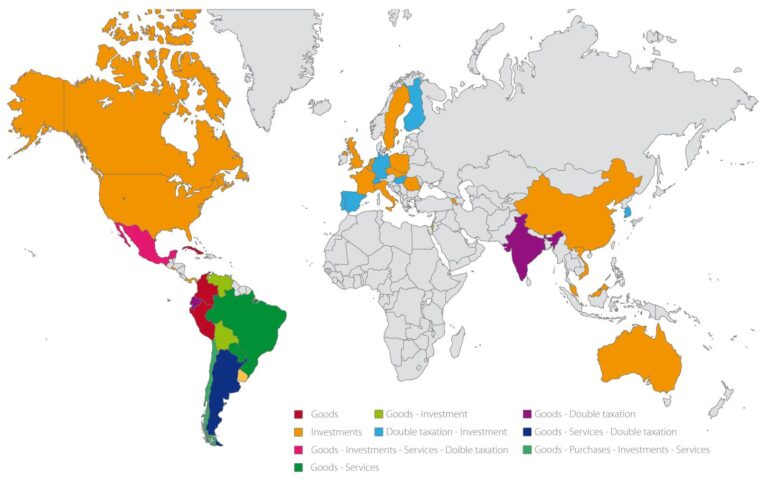Brazil is gearing up to finalize updated sector-specific trade agreements with Mexico, aiming to strengthen bilateral economic ties and boost trade in key industries. The move reflects both countries’ commitment to deepening cooperation amid shifting global trade dynamics. According to sources familiar with the matter, the revised deals are expected to enhance market access and address regulatory challenges, positioning Brazil and Mexico as strategic partners in the Latin American economic landscape.
Brazil and Mexico Intensify Trade Negotiations to Strengthen Bilateral Economic Ties
Brazil and Mexico are actively advancing revised trade discussions aimed at expanding cooperation across key sectors including automotive manufacturing, agriculture, and technology. Officials from both nations have identified a mutual interest in reducing tariff barriers, streamlining customs procedures, and enhancing regulatory alignment to create a more competitive trading environment. Emphasis is also placed on sustainable development initiatives to ensure that economic growth is balanced with environmental responsibility and social inclusion.
Key sectors targeted for updated agreements:
- Automotive: Boosting supply chain integration and joint innovation ventures.
- Agribusiness: Expanding export quotas and modernizing phytosanitary measures.
- Technology: Enhancing collaboration in digital infrastructure and R&D.
| Sector | Current Trade Value (USD Billions) | Projected Growth (%) |
|---|---|---|
| Automotive | 14.5 | 8 |
| Agribusiness | 7.3 | 10 |
| Technology | 3.1 | 15 |
Key Sectors Targeted in Updated Trade Agreements to Boost Competitiveness
Brazil and Mexico have identified key industries within their updated trade agreements aimed at strengthening regional economic ties while enhancing market competitiveness. The focus spans dynamic sectors such as automotive manufacturing, agribusiness, technology services, and renewable energy. These sectors are expected to benefit from reduced tariffs, streamlined customs processes, and joint investments in innovation, enabling both nations to solidify their positions in global supply chains. The renewed accord places particular emphasis on sustainability, encouraging collaboration in green technologies and clean energy projects.
The updated framework also highlights critical priority areas for bilateral development:
- Automotive parts and vehicle assembly
- Agricultural exports including soybeans and coffee
- Information and Communications Technology (ICT) services
- Renewable energy equipment and infrastructure
- Pharmaceuticals and healthcare products
To further illustrate the strategic impact, below is a summary of expected benefits per sector:
| Sector | Primary Benefit | Competitive Edge |
|---|---|---|
| Automotive | Tariff reduction on components | Cost efficiency, faster assembly |
| Agribusiness | Market access expansion | Diversified export destinations |
| Technology | Collaborative R&D incentives | Innovation-led growth |
| Renewable Energy | Joint infrastructure investment | Leadership in clean tech |
Policy Recommendations for Maximizing Benefits from Enhanced Brazil Mexico Trade Deals
To fully leverage the updated trade agreements between Brazil and Mexico, policymakers should prioritize a multifaceted approach focusing on infrastructure modernization and regulatory alignment. Enhancing cross-border logistics through upgraded ports, roadways, and customs facilities will significantly reduce transit times and operational costs, benefiting exporters and importers alike. Furthermore, harmonizing standards and certification processes in key sectors like automotive, agriculture, and electronics can streamline compliance, fostering smoother market entry and reducing bureaucratic delays.
Stakeholders must also emphasize investment in workforce development and innovation, ensuring both countries capitalize on new opportunities generated by the trade deals. Initiatives like vocational training tailored to emerging industrial demands coupled with joint R&D projects can accelerate technology transfer and boost competitiveness. To guide effective implementation, the following priority areas merit close attention:
- Customs process digitization to enhance efficiency and transparency
- Environmental sustainability standards aligned to support green trade practices
- SME inclusion programs facilitating access to new supply chains
- Dispute resolution mechanisms ensuring swift conflict management
| Policy Focus | Expected Benefit | Sector Impact |
|---|---|---|
| Customs Digitalization | 20%-30% reduction in clearance times | All sectors |
| SME Support Programs | Expanded market participation by 15% | Manufacturing, Agribusiness |
| Environmental Standards | Compliance with international green policies | Energy, Agriculture |
| Workforce Training | Increased productivity and innovation | Technology, Automotive |
To Wrap It Up
As Brazil moves forward with revised trade agreements with Mexico, both nations aim to strengthen bilateral economic ties and enhance cooperation across key sectors. Observers will be closely watching how these updated deals influence regional trade dynamics and contribute to broader efforts toward economic integration in Latin America. Further developments are expected in the coming months as negotiations progress.




